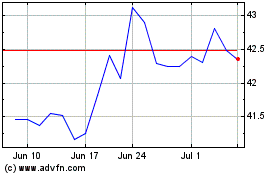Six out of 13 directors depart pipeline firm after collapse of
sale to Energy Transfer
By Liz Hoffman, David Benoit and Alison Sider
Nearly half of Williams Cos. board members quit Thursday after
they failed to oust the company's chief executive following its
collapsed merger deal with rival pipeline operator Energy Transfer
Equity LP, according to people familiar with the matter.
The resignations came during a closed-door session in which the
bloc sought to replace Chief Executive Alan Armstrong, who they
felt was ill-suited to lead an independent Williams as it sets out
a new course, the people said.
Chairman Frank MacInnis was among those who resigned, as were a
pair of activist hedge-fund investors, Keith Meister and Eric
Mandelblatt, who joined the 13-member board following a public
campaign in 2014, the people said. All three had championed the
merger with Energy Transfer, which Mr. Armstrong had opposed and
continued to oppose even after it was agreed.
A Williams spokesman didn't have immediate comment.
Last week, a Delaware judge ruled that Energy Transfer could
walk away from the takeover, which would have created one of the
largest U.S. oil-and-gas pipeline companies, with a 100,000-mile
network.
The deal was valued at $33 billion when it was originally signed
last fall. Energy Transfer's chairman, billionaire Kelcy Warren,
came to regret it as oil prices slid.
Williams had sued to force Energy Transfer to complete their
deal, but the judge sided with Energy Transfer, whose lawyers had
argued that they couldn't deliver a necessary opinion on the deal's
tax treatment.
Energy Transfer on Wednesday told Williams it intended to
terminate the deal. Williams has appealed the Delaware ruling and
has said it might also sue Energy Transfer for damages stretching
into the billions of dollars.
Williams's board met Thursday to discuss the company's strategy
going forward, the people said. The discussion turned to whether
Mr. Armstrong was the best person to remain at the helm. The
directors not including Mr. Armstrong were split evenly, with six
supporting Mr. Armstrong and six opposed.
Mr. MacInnis, who had been Williams's chairman since 2011, was
opposed to Mr. Armstrong remaining as CEO, but resigned largely for
personal reasons, one person said. Attempts to reach Mr. MacInnis
for comment were unsuccessful.
Five others followed suit, including Laura Sugg, a former
executive at ConocoPhillips; Ralph Izzo, CEO of utility giant
Public Service Enterprise Group Inc.; and Steven Nance, president
of a privately held oil and gas company. All three had been
supportive of the merger.
Rob Thummel, a portfolio manager at Tortoise Capital Advisors, a
large Williams investor, said the shake-up, while dramatic, may
help stabilize the company following a chaotic nine months during
which employees faced an uncertain future and shareholders lost
millions of dollars in stock-market value.
"We don't have anything against Alan, frankly, and would be fine
with him leading the company from this point on," Mr. Thummel said,
adding, "This seems to be one of the easier moves -- put the guy
back in place who was in charge before."
The Williams board has been deeply divided for months. The sale
to Energy Transfer was approved last September by a slim majority,
and the five dissenting directors reiterated earlier this year that
they remained opposed to the merits of the transaction.
As oil prices slid and financing for energy companies dried up,
Mr. Warren sought to undo or restructure the deal. He worried that
the $6 billion cash portion, which Energy Transfer planned to
borrow, would saddle the combined company with too much debt,
according to testimony aired in court last week.
It is unclear whether Messrs. Meister and Mandelblatt, who
teamed up to push changes, including exploring a sale at Williams,
will keep their shares. The two had been longtime holders of the
company's shares, but took a more aggressive posture in late 2013,
disclosing an 8.8% stake and a joint effort to get on the
board.
Keith Bailey, Williams's chief executive from 1994 to 2002, has
been a vocal opponent of the deal. With Williams likely to go
forward on its own, Mr. Bailey said he believes the directors that
pushed for the deal need to go.
Williams "needs to go forward with the management and board
committed to being an independent company," Mr. Bailey said.
"That's difficult to achieve if the board remains unchanged and
those committed to breaking the company up or selling it
remain."
Write to Liz Hoffman at liz.hoffman@wsj.com, David Benoit at
david.benoit@wsj.com and Alison Sider at alison.sider@wsj.com
(END) Dow Jones Newswires
July 01, 2016 02:48 ET (06:48 GMT)
Copyright (c) 2016 Dow Jones & Company, Inc.
Williams Companies (NYSE:WMB)
Historical Stock Chart
From Mar 2024 to Apr 2024

Williams Companies (NYSE:WMB)
Historical Stock Chart
From Apr 2023 to Apr 2024
